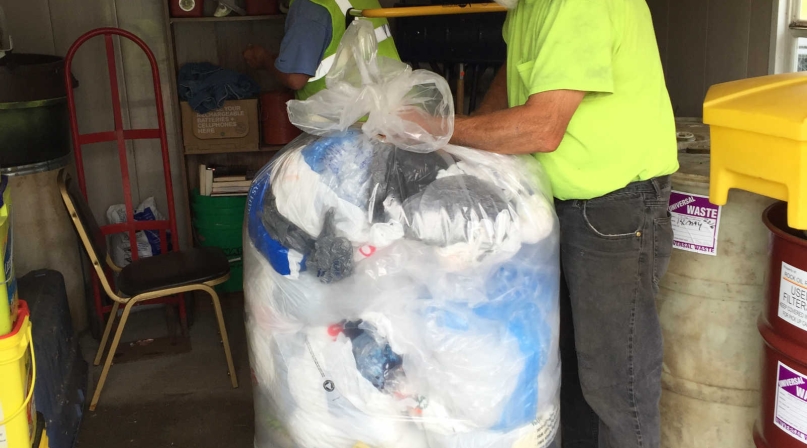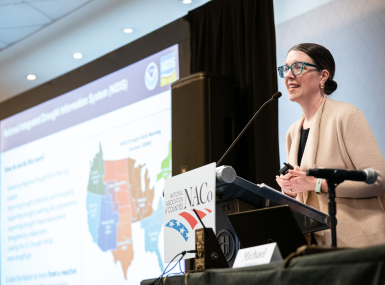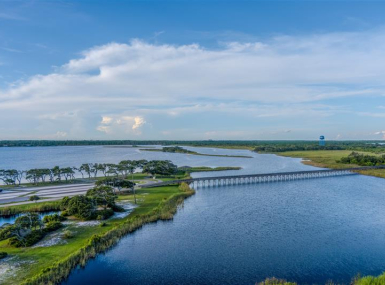Bright Ideas - July 25, 2016
Upcoming Events
Related News

For Rural Recycling Program, It's In the Bag
Problem: Plastic wrap and bags can gum up the works at recycling sorting and processing facilities.
Solution: A rural, drop-off recycling program that diverts tons of recyclable flexible plastics.
Dunn County, Wis.’s landfill is a little less full since county residents began recycling plastic bags and flexible plastic wraps in 2013.
That’s when the Dunn County Solid Waste Board volunteered to be a pilot community for Wisconsin WRAP (Wrap Recycling Action Program) to show what a rural county could do.
Since then, 4.5 tons of flexible polyethylene in the form dry-cleaners’ bags, bubble wrap, newspaper bags, packaging for rolls of paper towels and napkins — and similar items — have been diverted from the county’s waste stream.
You can give some of the credit to Recyclone, the county’s recycling mascot, for helping to promote it. Donning a caped costume “that’s blue and spandex-y,” the superhero’s alter ego, Amanda Hafele, is the county’s recycling specialist.
She’s been involved with WRAP since the beginning. In or out of costume, she speaks to community and school groups — anyone who’ll listen — about recycling, including that of plastic film and bags. Sometimes, her audiences are surprised to find out that things like packing air pockets and bread bags can be recycled.
“I have samples of a lot of the common items such as napkins, paper towels and bathroom tissue — the wrap around that — and case wrap for bottled water. You bring this out and eyes are like, ‘I don’t have to throw this away anymore?’”
To be recycled, the plastic must be dry and free of food or other organic residue. Nonos include frozen food bags, biodegradable plastic bags and salad-mix bags.
Nationwide, at least 1.17 billion pounds of plastic bags and flexible film or packaging was recycled in 2014, an increase of over 29 million pounds, or 3 percent, from the prior year and a 79 percent increase since 2005, according to the 2014 National Postconsumer Plastic Bag and Film Recycling Report.
Dunn County worked with the American Chemistry Council’s Flexible Film Recycling Group, the state’s Department of Natural Resources and a recycling company to design and launch the program. Hafele was able to secure a grant from the Community Foundation of Dunn County to help advertise the program.
Key to WRAP’s success is its partnership with Trex Co., which uses recycled plastics and sawdust to manufacture composite decking and railing. One of its standard 16-foot deck board contains approximately 2,250 recycled plastic bags.
Dunn County, population 44,000, is largely rural with a density of about 47 people per square mile. The bag drop-off points are at seven preexisting “full-service” Area Collection Stations, which also accept other recyclables. The WRAP program serves 20 of the county’s 23 municipalities. The county’s upfront costs were about $11,000 to purchase hand balers for the collection points and electrical connections for a bulk baler at the transfer station.
“They buy the baler,” Hafele of the company, “and then we pay for it through the material that we recycle to them. Right now, because markets are pretty low, they’ll pay us 13 cents per pound. They take 10 cents off the top and we receive only 3 cents, and that 10 cents goes to pay off the baler.”
For counties considering starting similar programs, Hafele said there’s a network of professionals, including Dunn County Solid Waste, who can help. There’s free information online at sites such as plasticfilmrecycling.org, run by the American Chemical Council’s Flexible Film Recycling Group. There you can find instructions on how to set up a collection program and downloadable posters, pamphlets and handout cards to promote them.
Bright Ideas features noteworthy and award-winning county programs.
Attachments
Related News

NOAA outlines help for counties navigating drought’s growing risks
In April, the National Integrated Drought Information System will launch the Mid-Atlantic Drought Early Warning System, which will help county officials allocate resources and attention to mitigate drought-related disasters.

House Agriculture Committee introduces 2026 Farm Bill
On February 13, House Agriculture Committee Chairman G.T. Thompson (R-Pa.-15) introduced the House version of the 2026 Farm Bill, the Farm, Food, and National Security Act of 2026.

Congress increases oversight of Gulf Coast Restoration Trust Fund
On February 3, Congress passed new funding and authority for an audit and expanded oversight of the Gulf Coast Restoration Trust Fund, which houses federal funds for recovery from the Deepwater Horizon oil spill disaster. The provision was included in the Financial Services-General Government appropriations bill (FSGG), which was one of five included in a minibus package passed by Congress (P.L. 119-75).